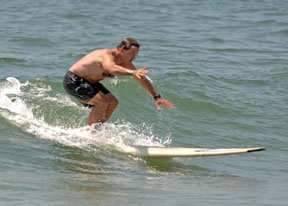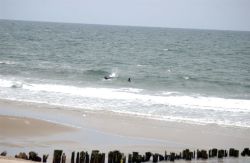Jamaica Bay and the Rockaways
The Daily Plant : Thursday, August 2, 2007
Surf, Surf, Surf Away At Rockaway Beach

Photo by Daniel Avila
On July 27, Commissioner Adrian Benepe, Assembly Member Audrey Pheffer, Surfriders Foundation’s NYC Chapter Co-Chair Erik Johnson, Community Board 14 District Manager Jonathan Gaska, and local surfers joined to declare Rockaway Beach’s B. 67-69 as the second surfing-only beach in the City. Surfers tried out the new location, which the surf community chose for its reputation of great waves, and taught Commissioner Benepe to catch his first wave.
Prior to 2005 it was considered illegal to surf in New York City but Assembly Member Pheffer and Council Member Joseph Addabbo, Jr. worked to overturn a provision in the state’s health code dating back to 1850 that prohibited even visiting the beach unless lifeguards were on duty. Changing that law was the final obstacle in the path toward making Rockaway Beach’s B. 87-91 the first legally surfable beach within New York City limits. Now, in response to the increasing popularity of the sport and requests by the local surf community, Parks designated B. 67-69 as the second surf-only beach in New York City.
Surf beaches are open year-round from dawn to dusk. Thanks to the added safety of a surfboard, there are no lifeguards on duty and no swimming is allowed. In addition to these rules, local surf organizations created the “Rules of Paddling,” which are posted at both locations. Both locations are accessible by the A train—stop at B. 67 or B. 90.
Over the years, the Rockaway peninsula, a barrier beach on the south shore of Long Island, has become something of a cult destination for surfers, starting in 1912 when Hawaiian swimmer, Olympian, and “father of surfing” Duke Kahanamoku visited New York City for a swimming exhibition. During his trip, he also put on a surfing exhibition on Rockaway’s shores. The Ramones immortalized the beach’s allure in their 1977 hit “Rockaway Beach” and since then, surfers have come from far and wide to catch the waves.
More than 2.1 million visitors flocked to Rockaway Beach during the 2006 season and Parks & Recreation is committed to meeting the needs of this vibrant, growing community and its visitors. In response to the neighborhood’s growth, last summer Jill Weber was appointed its first administrator. We recently completed a new ADA-compliant comfort station at Beach 117 Street, renovated two lifeguard trailers at Beach 32 and 86 St., and installed an ADA-accessible mobimat at Beach 116 St., which allows wheelchair-bound persons to approach the water’s edge. We will also be restoring the boardwalk at Beach 20-23 and Beach 70-80, installing new ramps at Beach 24 and 104, and renovating the picnic area at Beach 90. As a result of conversations with the community about their needs, we are coordinating the development of a dog run and increasing programming such as fitness activities, cricket permitting, skateboarding competitions and family events such as Movie Night. Finally, with Mayor Bloomberg’s PlaNYC, even more is to come at Rockaway Beach with the allocation of $40 million to build beachfront facilities such as comfort stations, lifeguard buildings and playgrounds.
Surfing is thought to have been invented by Polynesians more than 1500 years ago; they would stand on wooden boards and ply the Pacific. It was also a popular pastime for inhabitants of the South Sea Islands before European mariners voyaged there during the 16th and 17th centuries. In the 1950s and 1960s, surfing developed as a sport and a part of pop culture in the United States. The first world championships were held in 1964.
QUOTATION FOR THE DAY
“If an idea is worth having once, it’s worth having twice.”
Tom Stoppard
(1937 - )
Check out your park's Vital Signs
Clean & Safe
Green & Resilient
Empowered & Engaged Users
Share your feedback or learn more about how this park is part of a
Vital Park System

Know Before You Go
Ecology Park is only open at certain times of year when Parks staff are present in order to protect this unique landscape. Want to visit? Check out our Stewardship Projects page for restoration, planting, and educational events.



